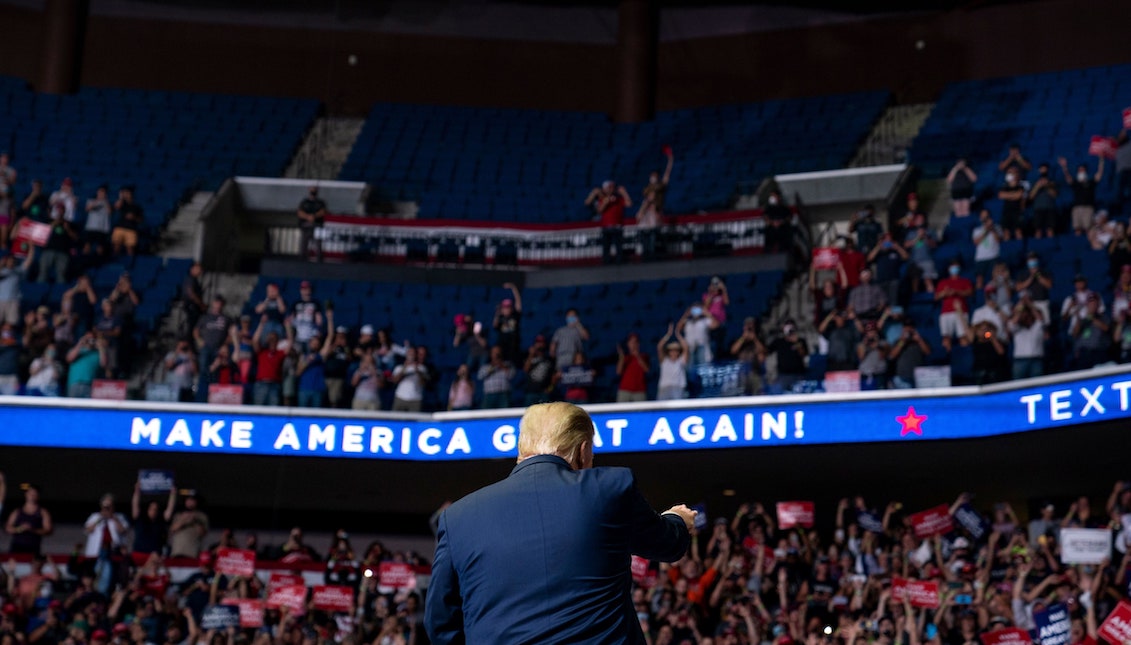
Three things we learned from Trump’s unfortunate rally in Tulsa
The president was hoping to return to the reelection campaign with all the tickets sold out at a stadium in Tulsa. The reality was quite different.
The American president is having a bad couple of weeks when it comes to approval. Or at least that's what he's let us know.
Since the Supreme Court rejected two attempts by the administration to end protections for LGBTQ+ people and undocumented youth (called Dreamers) last week, the president has returned to the fray in his re-election campaign to face a tide of empty seats in Tulsa, Oklahoma, last Saturday.
After the Supreme Court decision, Trump was wondering on Friday on Twitter: "Do you get the impression that the Supreme Court doesn’t like me?" Twenty-four hours later, the impression would be much the same, but from his followers.
In what many have called the U.S. president's "exaggerated return" to the campaign, he failed to fill a 19,000-seat arena in a city known as "Oklahoma's Republican stronghold," according to The Guardian.
While Trump tried to defend himself by calling the half-empty arena "the silent majority," others, such as former Barack Obama senior adviser Dan Pfeiffer, were saying what we all thought: the emperor doesn't have a crowd.
The Emperor has no crowd
— Dan Pfeiffer (@danpfeiffer) June 21, 2020
The few people who attended the presidential return were due, in part, to warnings of the high risk of COVID-19 infection in an event that, in all likelihood, contradicted the recommendations of the Centers for Disease Control and Prevention (CDC).
But it also had to do with the dual political rhetoric that exists in the country, between those who fill the streets protesting racism, and those who still stand for the president.
During the past few months, the virus has killed nearly 120,000 Americans, severely impacted the job market, and set the tone for the country's widespread discontent with the government.
For the president, the pandemic it’s a rather funny issue.
“Testing is a double-edged sword,” he told the rally. “We’ve tested now 25 million people. It’s probably 20 million people more than anybody else. Germany’s done a lot. South Korea’s done a lot. Here’s the bad part, When you do testing to that extent, you’re going to find more people. You’re going to find more cases. So I said to my people, ‘Slow the testing down, please!’”
Trump also resorted to his racist rhetoric by calling the virus "Kung Flu" in reference to the origin of the disease in China.
The presidential speech also addressed the protests against the police violence that killed George Floyd and calls for defunding police departments nationwide.
Trump went further and re-criminalized Latinos in his speech, arguing for the need to have police in communities.
“It’s one in the morning, and a very tough – I used the word on occasion – hombre is breaking into the window of a young woman whose husband is away as a traveling salesman or whatever he may do. And you call 911 and they say, ‘I’m sorry this number is no longer working,’” the president said.
With regard to the black community, he also claimed to have done "more for the black community in four years than Joe Biden has done in 47 years.”
RELATED CONTENT
One of the most important reasons why the presidential rally was so empty has been, his campaign said, because they received more than a million requests for tickets that ultimately were not submitted.
Apparently, it was a move by young voters and teenagers on the social networking site TikTok and K-pop fans who began posting registration information on social media along with notes encouraging people to register without intending to attend, according to the Washington Post.
A day after the Trump campaign announced the event, a social media personality named MaryJo Laupp posted a video on TikTok saying, “I recommend that all of those of us that want to see this 19,000-seat auditorium barely filled or completely empty, go reserve tickets now and leave him standing there alone on the stage.”
@maryjolaupp I’m tired, y’all. ##TikTokGrandma ##TrollBlocking ##Over50
♬ original sound - maryjolaupp
Since the video was posted, it has been played over 2 million times.
However, the Tulsa fire chief's office assured the media that fewer than 6,200 people attended the presidential event, not counting those protesting against it outside.
Trump's campaign manager, Brad Parscale, blamed the latter in part, calling them "radical protesters" and blaming the media for "a week of apocalyptic coverage.”
However, as Rep. Alexandria Ocasio-Cortez (D-N.Y.) put it, the campaign was actually shaken up by teenagers in TikTok who "flooded the Trump campaign with fake ticket reservations" and who tricked them into believing that "a million people wanted your white supremacist open mic enough to pack an arena during COVID.”
"Kpop allies, we see and appreciate your contributions in the fight for justice too," she added.
Actually you just got ROCKED by teens on TikTok who flooded the Trump campaign w/ fake ticket reservations & tricked you into believing a million people wanted your white supremacist open mic enough to pack an arena during COVID
— Alexandria Ocasio-Cortez (@AOC) June 21, 2020
Shout out to Zoomers. Y’all make me so proud. https://t.co/jGrp5bSZ9T











LEAVE A COMMENT: